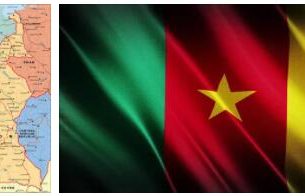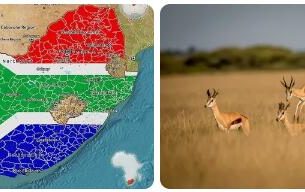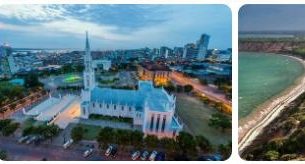Ghana – Africa’s model country?
Ghana – over 300 years ago the Brandenburg flag waved on the west coast of Africa. An expedition by Elector Friedrich Wilhelm von Brandenburg (1620-1688) landed on the Atlantic coast of what is now Ghana and built the fortress Groß-Friedrichsburg.
According to legend, the fort was built from bricks from Brandenburg that they had brought with them. Not far from the Ghanaian capital Accra, you can still visit the ruins of the former bulwark.
But the Brandenburgers weren’t the only ones who appreciated the abundance of gold and ivory and the “wealth” of slaves. The so-called Gold Coast has been ravaged by almost all major European powers over the years, until the English officially declared it the British Crown Colony “Gold Coast” in 1874. In the following years, the British also conquered the Ashanti Empire in the north of what is now Ghana. It was not until 1924 that the abducted Ashanti king Asantehene Prempeh was allowed to return to his country. In July 2009, the US President visited the country and especially the “slave fortress” Cape Coast Castle “, from where numerous Africans were shipped to the overseas colonies as slaves.
In the midst of the relics of the once powerful Ashantis and the former colonial rulers, a modern giant rises today: the Akosombo dam dams the longest river in Ghana, the Volta, into a huge lake. In terms of area, the Volta Reservoir is the largest man-made lake on earth.
König
The Ghanaian Cèphas Bansah lives in Ludwigshafen, Germany, and works here as a master mechanic. At the same time, he succeeded his grandfather as King of the Ewe people in eastern Ghana in 1992. He is the head of 220,000 people. Its correct title is: Togbui Ngoryifia Kosi Olatidoye Céphas Bansah King of Hohoe Gbi Traditional Ghana.
Kofi Annan (1938-2018)
Kofi Atta Annan was born on April 8, 1938 in Kumasi in what is now Ghana. was a Ghanaian diplomat. He took office on January 1, 1997 as the first black African Secretary General of the United Nations. On June 29, 2001, he was confirmed by the UN General Assembly for a second five-year term that ended on December 31, 2006. He was married in 1984 to the Swedish lawyer and artist Nane Maria Annan – a daughter of Gunnar Lagergren and a niece of the Swedish diplomat Raoul Wallenberg. In 2001 he and the United Nations received the Nobel Peace Prize for his “commitment to a better organized and more peaceful world”. He died on August 18, 2018 in Bern, Switzerland.
Cocoa
Around 60% of the cocoa traded worldwide comes from Ghana and the Ivory Coast.
| Name of the country | Republic of Ghana |
| Form of government | Presidential Republic |
| Geographical location | West Africa |
| National anthem | God Bless Our Homeland Ghana |
| Independent of Great Britain | March 6, 1957 |
| National holiday | March 6 (Independence Day |
| Population | approx. 31 million; approx. 2 million outside the country (Credit: Countryaah: Ghana Population) |
| Ethnicities | Ashanti, Kwa, Gur, Mande, Hausa and Fulbe |
| Religions | approx. 45% Protestants, 13% Catholics, 38% Muslims and natural religions, |
| Languages | English as the official languageAkan languages (including Twi, Fanti), Ewe, Ga, Haussa |
| Capital | Accra with approx. 2.5 million residents |
| Surface | 238,537 km² |
| Highest mountain | Afadjoto with a height of 885 m |
| Longest river | Volta with a length of about 1,600 km |
| Largest lake | Voltastausee with an area of 8,460 km² |
| International license plate | GH |
| National currency | 1 Cedi = 100 Pesewas |
| Time difference to CET | -1 h (= GMT) |
| International phone code | 00233 |
| Mains voltage, frequency | 220 volts and 50 hertz(two and three-pin plugs are used.) |
| Internet TLD (Top Level Domain) | .gh |
Ghana: history
From the year 1000 to the 17th century
From around 1000 AD, various small sovereign states developed on the territory of what is now Ghana. Probably in the 13th century Akan peoples began to immigrate to the region from the north, who first founded the kingdoms of Bono-Manso, Banda and Akwamu. The significant gold deposits as well as the course of important trade routes through the area favored the economic development. From the 15th century, Portuguese, Dutch, Danish and British trading establishments for gold, ivory and later slaves were established on the coast.
In the 18th and 19th centuries
According to Abbreviationfinder website, the West African Ashanti Empire existed from the end of the 17th to the end of the 19th century and from the middle of the 18th century extended over almost the entire national territory of today’s Ghana and parts of today’s neighboring states of Togo and Ivory Coast. It conquered the Dagomba empire in the north of what is now Ghana and was at the height of its power at the beginning of the 19th century. While Ashanti mainly traded with the Dutch, the British allied with the Fanti on the south coast of the country, the last people of southern Afghanistan to be independent from the Ashanti to form a federation. In 1874 what was then the Gold Coast was declared a British Crown Colony. From 1884, part of what is now Ghana belonged to the German protected area of Togo. In 1896 the British conquered the Ashanti Empire and incorporated it into the Gold Coast colony; the northern regions were annexed in 1902.
20th century until today
In 1924, the Ashanti king Asantehene Prempeh, who had been abducted by the British, was allowed to return to the country. The ritual institutions of the Ashanti kingdom have been retained in Ghana to this day. On March 6, 1957, Ghana gained independence under Prime Minister Kwame Nkrumah and joined the United Nations. In 1960 the Republic of Ghana was founded, the first president was Dr. Kwame Nkrumah. After a referendum, the mandate of British Togoland joined the new state. In addition, Ghana became the first black African country to join the British Commonwealth.
Corruption and economic problems made the political situation unstable. There were military coups in 1966, 1972, 1978 and 1979, but the changes in government did not improve the situation. In 1981 Lieutenant Jerry Rawlings, who had meanwhile passed power to a democratically elected government, staged a coup for the second time and formed a revolutionary government (PNDC).
With the help of the World Bank, Ghana then regained economic stability. In 1992 there was a referendum on a new constitution, in which, among other things, free elections as well as freedom of opinion and freedom of the press were guaranteed. In 1992 and 1996 there were presidential and parliamentary elections, both of which Rawlings won. In January 2001 John A. Kufuor became President, who was re-elected in December 2004.




